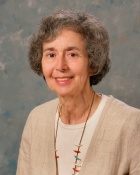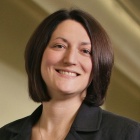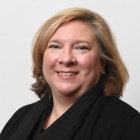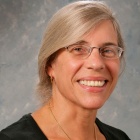
Celebrating a storied career in vital research
Students, professors, practicing lawyers and the occasional public scholar will all miss a key ally at the Charles B. Sears Law Library. After 44 years of service and a career that bridged the transition from paper-based resources to digital and online research, law library faculty member Marcia Zubrow retired this past spring.

Read a Q & A with Marcia Zubrow
Zubrow was head of information services, with responsibility for the team of research librarians who point the way to the laws, statutes, cases, and legislative histories that can make or break a lawyer’s case or build the foundation for a student’s research paper. She also played a significant role in the law school’s Legal Analysis, Writing and Research curriculum, teaching first- and second-year students the techniques of legal research, and made frequent guest appearances in doctrinal courses to teach subject-related research skills.
Known for her commitment to collegiality—she always attended her colleagues’ presentations and supported their work—and the widespread connections she made among law librarians nationwide, Zubrow leaves a legacy of professionalism and skill that set a standard for decades. Some thoughts from those who worked with her:

Elizabeth Adelman, vice dean for legal information services and law library director: “There’s an art and a science to legal research, and she combined the two perfectly. I cannot emphasize enough how she was able to find anything, even the most obscure pieces of information. She was amazing for the depth of her knowledge and the skill that she acquired over the years.”

Bernadette Gargano, vice dean for student affairs and former director of the LAWR program: “She was always available to our faculty and students to guide them in their research and in so many other ways. Once at Chautauqua, I ran into someone, not a lawyer, who had gone to Marcia for help with a presentation he was doing. There was a particular case from Massachusetts in 1781 that he was looking for and Marcia helped him locate the text. The case held that a man and a woman who were enslaved had to be freed based on the clause from Commonwealth’s constitution that ‘all men are born free and equal.’ No matter where I go, Marcia has had an impact on people.”

Terrence McCormack, interim associate university librarian for digital strategies: “Marcia was very active in the work of the University Libraries faculty. She served, repeatedly, on the Appointment, Promotion, and Tenure Committee as well as the Faculty Executive Committee. She was a strong promoter of faculty status for librarians and of maintaining the standards of recruitment and retention of librarians University wide. She was also careful to protect the integrity of the law library’s collection and very interested in maintaining a quality collection for faculty, students, and staff.”

Joseph Gerken, reference librarian: “Marcia just loved every day here. You could feel that, and that was a huge influence on me. I walked into the library one day and three of the research librarians were trying to dig up some information for one of the faculty, and they were having a blast. The more challenging it was, the more fun it was. They were my image of being a law librarian.”

Nina Cascio, international law librarian: “Marcia is the consummate reference librarian. In assisting our patrons with research questions, she would leave no stone unturned. The most difficult questions warranted follow-through, and Marcia would apply her vast experience and creative skills to approach the questions from a variety of vantage points until she was satisfied with what she uncovered.”
Q & A with Marcia Zubrow
In a brief interview, the consummate researcher reflected on her craft and her career.
You’ve had remarkable longevity in the Law Library. What has been the most rewarding part of the work for you?
The people have been the reward. With the faculty, I’ve learned from them as well as helped guide them with research, and that was very rewarding. Working with the administrators and the staff of the law school, everyone is very supportive. Working with students was always an eye-opener, especially if you had the chance to get to know them a little better. And members of the public—there have been some very interesting people, not just members of the bar and judges, but people who were working pro se on their own legal issues, many of them coming into the library not knowing anything about legal research. They are so persistent. And of course, my colleagues in the university libraries and especially in the law library—I’ve learned so much from them, not only about legal research and librarianship but how important and how lucky I was to be a faculty member of the university.
I was part of an educational process that for some people was life-changing. To be part of all of that was extremely rewarding.
You’ve had a significant role in teaching legal research skills to our students. What do you like most about working with law students?
I always enjoyed watching the students becoming competent and confident as researchers. Also, each time you teach something you learn something new about what you’re teaching, and you find ways to improve how you’re presenting it. It’s always interesting when I meet former students and they say, “I remember when you taught me this.” I saw them as nervous 1Ls and then watched them become confident in their own skills.
You’ve helped the library make the huge transition from analog to primarily digital resources, and into the era of online and subscription-service research. What are the pluses and minuses of this new era of legal information?
When I started in the law library, there were no computers at all. It was in 1978 when the law library subscribed to Lexis for the first time, and we wanted to be part of that revolution from the beginning. There are many pluses of electronic research. There’s extensive, almost instant access to both current and older legal materials, and especially to rare materials. Databases and individual books are in searchable digital forms. I often think about the cost and how there are haves and have-nots in this world. A great deal of legal resources are certainly available online, but not available to everyone.
You had a role in the creation of a 1988 amendment to a New York State statute intended to protect the privacy of library records. Could you tell us more about that?
At Lockwood Library one night, an FBI agent showed up and asked to see a student’s records. This became an issue not only here but in other places as well, that library records were being requested. At the time, there was a law in New York State that protected the confidentiality of users of printed material, but this was a request for the record of database use, which wasn’t included in the law. I was in a group of librarians, the Reference Interest Group, and we decided we needed to request an amendment to this law. Luckily, Professor Ken Joyce was chairing the New York State Law Revision Commission. I wrote to Ken asking for this change; he had people work on it, and lo and behold, it was amended. My slight claim to fame!
It’s said a great researcher is someone who can solve tough puzzles. Where do you think your analytical skills come from—nature or nurture?
I think it was nurture. Not that I wasn’t curious before but being in an environment that encouraged questioning and being inquisitive really developed those skills.
What’s the strangest reference request you ever got, or one that particularly sticks out in your mind?
There’s no one request, but even things that you think are going to be no problem can sometimes get difficult and frustrating. Every reference librarian has encountered situations of that sort. But it’s also part of the excitement—the chase is exciting.
Librarians often say that in retirement they’ll finally have a chance to catch up on their reading. Is that you, or do you have other plans?
I am reading a lot more, and my husband and I are hoping to do some traveling. I’ve made a foray into volunteering, helping the local Democratic committee in the Sarasota, Florida area with some legal research they need.